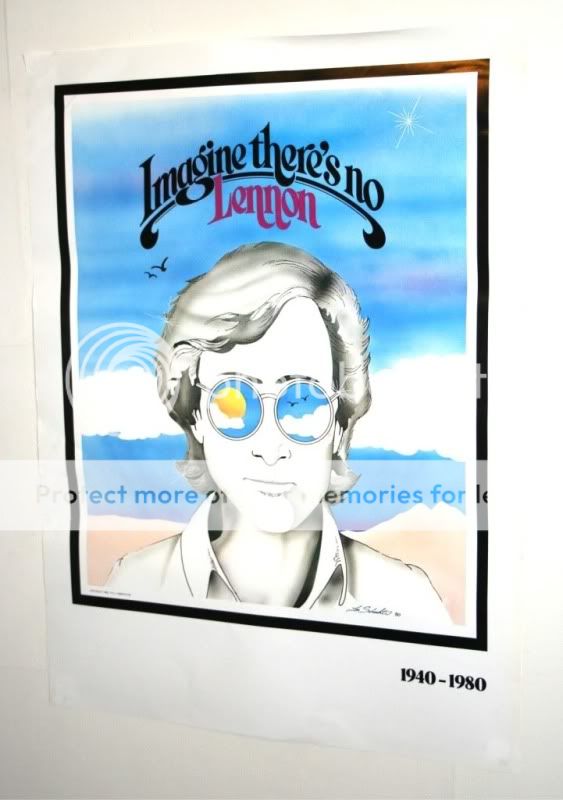The Legend of Lennon
Earlier this year I turned 41, making me older than John Lennon was when he died. That was a weird feeling. Every Rock star has an Ideal Iconic Death Age (or IIDA), a specific point in their career when their death would have the most iconic resonance. Generally the longer a Rock star lives, the less iconic they are. 27 years of age seems to be the exact right number for a lot of Rock stars since that is the age where they are still almost considered young, yet have also produced enough music to hold the attention of Rock fans. Members of the infamous Club 27 include Cobain, Hendrix, Morrison, Joplin and Brian Jones.
Luckily John Lennon is not a member of this club, for if he would have died at 27 we would not have "I am the Walrus", "Come Together" "Revolution" or "Imagine" (and the world never would have heard of Yoko Ono, either). But in many ways, Lennon's status as an Icon goes much further than his catalog of music.
A lot of people may balk at the idea of claiming John Lennon to be a humanitarian; a man accused of abandoning his first wife and neglecting his first child, and being addicted to heroin, a man who was accused of murder, accused of subversive activities, accused of engaging in homosexual acts, accused of having affairs. Although Lennon wasn't a humanitarian in the sense that he saved starving orphans in Africa, he did use his fame to advertise/spread the idea of love and peace. Big Deal, you say? Well, it might be hard to imagine a time when a musician could have an impact on society the way Lennon did. Today musicians rarely even speak of politics and when they do (for example, someone like the Dixie Chicks making a few offhand comments against Bush) we see how much crap they get in return. Lennon was protesting at 100 times the rate and at 100 times the scrutiny of anyone today. He was so feared by the US government, in fact, that Feds were tapping his phones and secretly following him around. One concrete example of Lennon's influence was when he debuted his song "John Sinclair" at a protest rally and within hours Sinclair was released from jail--instead of serving the ten year sentense he was due.
But Lennon's "work" as a humanitarian was best felt in a more personal way. After all, what can one person really do to change the world beyond being the best possible person that he or she can be? That was what Lennon was all about. Realistically, Lennon had issues he had to deal with. He was conceived and born amidst the height of destruction during World War II. His old man was a horny old sailor who abandoned him, and his teenage mother ended up leaving him with his aunt. Most of us know the story of how Lennon married young (namely because he got Cynthia pregnant) and how he was thrust onto the world stage at a young age. Later in life, Lennon tried to repair his relationship with his son Julian, and from all accounts Julian has nothing but kind things to say about his father. Perhaps Julian realizes that the world was a better place because Lennon followed his muse and gave us all of this great music (even if it was at the temporary expense of a happy family life for Julian). And maybe Julian also knows that Lennon's legacy goes beyond just the music.
There are several examples of how Lennon touched individuals in a deep way. Many of the examples the media dwell on are the more negative ones like the Charles Manson's Helter Skelter theories or the sordid details around Lennon's own assasination. Both of these examples illustrate the way Lennon connected with the outcasts of society, but despite these few bad apples, Lennon has given comfort to plenty of outsiders over the years (myself included) in a much more positive way.
Perhaps it is this personal way he affects people that impacts society at large. And perhaps this is why when we think of his death we look at it in the larger context of society as a whole. The timing of Lennon's death in 1980 happened just weeks after Ronald Wilson Reagan was elected president (if you recall the Beatles British Invasion is often linked to the Kennedy assasination, because the nation was in such a deep state of mourning that people were desperate for some upbeat, good-natured fun and the Beatles seemed to be the only ones capable of providing at the time). Its also relevant that Lennon's death happened at the begining of a decade known for a lot of the things that Lennon spoke out against, namely excessive materialism, greed, commercialism, etc. Beyond that, there is a more direct comment that Lennon's death seems to make about our culture and the bizarre obsession that certain people have of wanting to be close to those who are famous.
But in the end, Lennon's life far overshadows his death. Lennon's ultimate gift was that he simply touched people in a very direct and intense way. Surely he will be remembered in part because he wrote some great fucking songs, and also because he lived a truly mythical life, but to many it was the manner in which he unflinchingly examined and expressed the complicated inner search for truth that he was constantly struggling with that really seems to resonate with anyone who has ever attempted to attain a deeper understanding of life. For those people Lennon will always serve as a touchstone
2009 Rockism 101. All Rights Reserved


polo ralph lauren outlet
ReplyDeletecheap ugg boots
uggs on sale
mlb jerseys cheap
louboutin sale
canada goose clothing
gucci belts
gucci outlet online
abercrombie and fitch clothing
mcm handbags
2016.12.21xukaimin